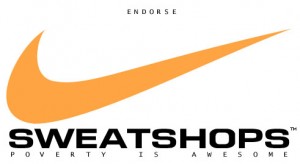Nike, the sports goods giant, and its association with sweatshops is by now widely known and reported, most or many of Nike’s customers are now well aware of this unethical production outsourcing technique, yet Nike, to the current day, retains a large part of its market. The question that comes into mind, and which i hope to answer today is: are unethical activities profitable?
The Play Fair at the Olympics Campaign is but one of many examples which I am able to use; the campaign is run jointly by Oxfam and Global Unions, they are an international confederation of trade unions and their aim within the campaign is to ensure that products used within the Olympics are made by companies which maintain fair labor standards.
the Olympics is a major sporting event, a great opportunity to market sportswear brands as reliable, high quality products, as they are worn and used by the best athletes in the world. The added restriction of the company having to use fair labor laws is a huge danger to the brand image of most major sports brands in the world today.
Such campaigns and public pressure make unethical business techniques and traditions very costly, the added pressure of losing customers runs counter productive to any organization’s efforts. Therefore, in conclusion, while unethical businesses may profit in the short term, if the customers are informed of said unethical business, the company will not profit in the long term.
Original Article by the Economist: http://www.economist.com/node/3107741
Picture: http://www.toolness.com/nike/

